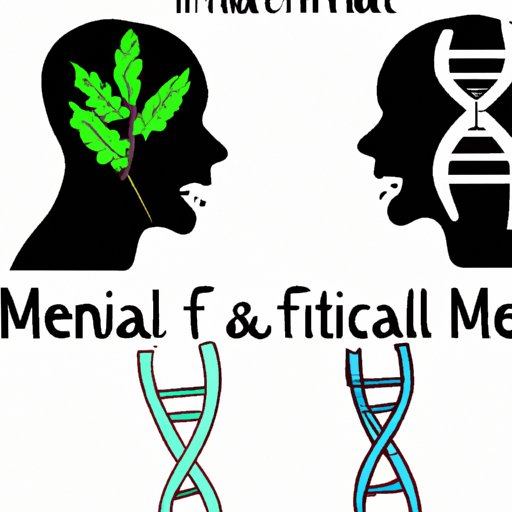
Are Mental Illnesses Genetic?
When it comes to mental health, one of the most debated topics is whether or not mental illnesses are genetic. Some believe that mental illnesses are solely caused by environmental factors, such as life experiences and upbringing, while others believe that genetics play a significant role. In this article, we will explore the research behind the genetics of mental health and uncover the truth of this controversial topic.
Debunking the Myths: The Truth About Genetic Predisposition to Mental Illness
Many myths surround the idea of genetic predisposition to mental illness. One common misconception is that if one of your family members has a mental illness, you are doomed to develop it too. However, this is far from the truth. While genetics can increase the likelihood of developing a mental illness, it does not guarantee it.
Another common myth is that mental illness is solely a result of environmental factors, such as a traumatic experience or life event. However, genetics play a significant role in the manifestation of mental health conditions.
It is important to understand the truth about genetic predisposition and mental health in order to develop healthy coping strategies. By recognizing the possible influence of genetics on your mental health, you can take proactive steps to promote positive mental wellbeing.

Nature vs Nurture: The Role of Genetics in Mental Illness
The age-old debate of nature vs nurture is relevant when discussing the role of genetics in mental health conditions. Nature refers to a person’s biological makeup, such as genes, while nurture refers to a person’s environment and upbringing.
It is essential to emphasize the complexity of the relationship between genetics and the environment when discussing mental health. In truth, while genes can increase susceptibility to certain mental illnesses, environmental factors also play a crucial role in triggering the onset of these conditions.
It is important always to consider the relationship between nature and nurture when talking about mental health
Breaking the Stigma: Understanding the Genetic Basis of Mental Health
One of the biggest obstacles to addressing mental health is the negative stigma that surrounds it. Many people are hesitant to seek help due to shame, discrimination, or a lack of understanding about the nature of the disorders.
However, understanding the genetic basis of mental health can help to break down this stigma. By recognizing the biological nature of mental illness, individuals can better understand that conditions such as depression or anxiety are not just a result of personal weakness or inability to cope.
Education about the true nature of mental illness can promote better mental health education and care. By breaking the stigma, individuals can seek support for their conditions without shame or discrimination.
Untangling the Complex Relationship Between Genetics and Mental Health
The relationship between genetics and mental health is complex. Researchers have found that various genes can influence the likelihood of developing a mental illness, but the role that each gene plays is not yet fully understood.
Scientists are continuing to research the genetic basis of mental health to gain a deeper understanding of the relationship. One of the significant challenges researchers face in studying this relationship is that mental health disorders are incredibly variable, making them challenging to categorize and study.
Continued research is crucial to untangle the complex relationship between genetics and mental health.
Family Ties: How Genetics Impact Mental Health Conditions
Family histories can be essential in understanding the connection between genetics and mental health conditions. Research has shown that certain mental health conditions have a higher prevalence within specific families and are often transmitted across generations.
Some mental health conditions with strong genetic ties include bipolar disorder, schizophrenia, and autism spectrum disorder.
Understanding family histories and genetics is crucial to the prevention and early diagnosis of mental health conditions.
Exploring the Link Between Genetics and Mental Health Disorders
There are numerous mental health disorders with a genetic basis. Some examples include:
- Major depressive disorder
- Anxiety disorders
- OCD
- ADHD
Each of these conditions has a unique genetic basis. For instance, depression and anxiety disorders are linked to a gene known as SLC6A4, which influences serotonin levels in the brain.
Understanding the genetic factors that contribute to these disorders can help psychiatrists and healthcare professionals provide tailored, more effective treatment plans to those who need them.
Nature or Nurture? The Importance of Genetics in Mental Health Discussions
Genetics play a vital role in the discussion of mental health and how it is approached from a treatment perspective. The nature vs nurture debate will continue on in every facet of our lives, including in the realm of mental health.
It is important to include genetics in any discussion about mental health as it can help individuals understand that a mental health condition is not a choice or character flaw, but rather a condition with a genetic component.
By taking a comprehensive, holistic approach to mental health, which includes genetics, individuals and healthcare professionals can develop the most effective treatment plans possible.
Conclusion
The genetic basis of mental health is a complex topic. While genes can influence an individual’s likelihood of developing a mental illness, environmental factors can also play a role in its manifestation.
Understanding this relationship is crucial to promoting mental wellbeing and breaking down the negative stigma surrounding mental health. It is critical to continue researching the genetic basis of mental health to provide tailored, effective treatment plans to those who need them.
If you or someone you know is struggling with mental health, reach out for support. Talking to a healthcare professional or therapist can help manage symptoms and develop healthy coping strategies.





